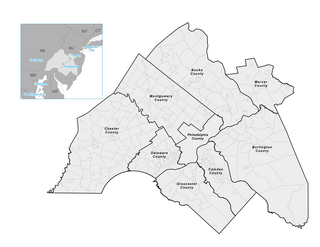
Smart growth is an urban planning and transportation theory that concentrates growth in compact walkable urban centers to avoid sprawl. It also advocates compact, transit-oriented, walkable, bicycle-friendly land use, including neighborhood schools, complete streets, and mixed-use development with a range of housing choices. The term "smart growth" is particularly used in North America. In Europe and particularly the UK, the terms "compact city", "urban densification" or "urban intensification" have often been used to describe similar concepts, which have influenced government planning policies in the UK, the Netherlands and several other European countries.
The Attorney General of Ireland is a constitutional officer who is the legal adviser to the Government and is therefore the chief law officer of the State. The Attorney General is not a member of the Government but does participate in cabinet meetings when invited and attends government meetings. The current Attorney General is Séamus Woulfe, SC.
Local Agency Formation Commissions or LAFCOs are regional service planning agencies of the State of California. LAFCOs are located in all 58 counties and exercise regulatory and planning powers in step with their prescribed directive to oversee the establishment, expansion, governance, and dissolution of local government agencies and their municipal service areas to meet current and future community needs. LAFCOs were established in 1963 and administer a section of California planning law now known as the Cortese-Knox-Hertzberg Local Government Reorganization Act of 2001.
Massachusetts shares with the five other New England states a governmental structure known as the New England town. Only the southeastern third of the state has functioning county governments; in western, central, and northeastern Massachusetts, traditional county-level government was eliminated in the late 1990s. Generally speaking, there are four kinds of public school districts in Massachusetts: local schools, regional schools, vocational/technical schools, and charter schools.

New Jersey Pinelands National Reserve is a national reserve that encompasses the New Jersey Pine Barrens.

The Delaware Valley Regional Planning Commission (DVRPC) is the metropolitan planning organization for the Delaware Valley. Created in 1965 by an interstate compact, DVRPC is responsible for transportation and regional planning in the greater Philadelphia area.
Nilsa Cruz-Perez is an American Democratic Party politician who was sworn into office to represent the 5th Legislative District in the New Jersey Senate on December 15, 2014, to fill the vacant seat of Donald Norcross. She had previously served in the New Jersey General Assembly from 1995 to 2010 and is the first Latina woman to serve in the Assembly.
Patrick J. Diegnan Jr. is an American Democratic Party politician, who represents the 18th Legislative District in the New Jersey Senate having done so since 2016.

The primary unit of local government in the U.S. state of Connecticut is its 169 towns. Each of these towns may contain incorporated cities or boroughs, as well as unincorporated villages.
Local government in New Jersey is composed of counties and municipalities. Local jurisdictions are simpler in New Jersey than in other states because every square foot of the state is part of exactly one municipality; each of the 565 municipalities is in exactly one county; and each of the 21 counties has more than one municipality. New Jersey has no unincorporated areas, independent cities, or consolidated city-counties.

The Commonwealth of Massachusetts is governed by a set of political tenets laid down in its state constitution. Legislative power is held by the bicameral General Court, which is composed of the Senate and House of Representatives. The governor exercises executive power with other independently-elected officers: the Attorney General, Secretary of the Commonwealth, and Auditor. The state's judicial power rests in the Supreme Judicial Court, which manages its court system. Cities and towns act through local governmental bodies to the extent that they are authorized by the Commonwealth on local issues, including limited home-rule authority. Although most county governments were abolished during the 1990s and 2000s, a handful remain.

The community boards of the New York City government are the appointed advisory groups of the community districts of the five boroughs. There are currently 59 community districts: twelve in Manhattan, twelve in the Bronx, eighteen in Brooklyn, fourteen in Queens, and three in Staten Island:

Beth Simone Noveck is a professor in the Technology, Culture, and Society department at New York University’s Tandon School of Engineering and director of the Governance Lab and its MacArthur Research Network on Opening Governance. She is an inaugural ICMA Local Government Research Fellow. In 2018, she joined the Murphy administration as New Jersey's first Chief Innovation Officer. She is also an affiliated professor at NYU's Center for Urban Science and Progress and Visiting Senior Faculty Fellow at the John J. Heldrich Center for Workforce Development at Rutgers University, a Fellow at NYU's Institute for Public Knowledge and a Senior Fellow at the Yale Law School Information Society Project. She also serves as one of nine members of the Digitalrat, a council to advise German Federal Chancellor Angela Merkel on issues concerning the digital transformation of society.
The Michigan Department of Technology, Management, and Budget, formerly Michigan Department of Management and Budget, is a principal department of the government of Michigan responsible for various support functions within the government.

The Maryland Department of Planning (MDP) is a cabinet-level agency in the government of the State of Maryland. The department is part of the Executive branch of the government and reports to the Governor of Maryland.

The Greater Manchester Combined Authority (GMCA) is a combined authority for Greater Manchester, England. It was established on 1 April 2011 and consists of eleven indirectly elected members, each a directly elected councillor from one of the ten metropolitan boroughs that comprise Greater Manchester together with the Mayor of Greater Manchester. The authority derives most of its powers from the Local Government Act 2000 and Local Democracy, Economic Development and Construction Act 2009, and replaced a range of single-purpose joint boards and quangos to provide a formal administrative authority for Greater Manchester for the first time since the abolition of the Greater Manchester County Council in 1986.
The North Jersey Transportation Planning Authority (NJTPA) is the federally authorized metropolitan planning organization (MPO) for the 13-county northern New Jersey region, one of three MPOs in the state. NJTPA's annual budget is more than $2 billion for transportation improvement projects. The Authority also participates in inter-agency cooperation and receives public input into funding decisions. The NJTPA sponsors and conducts studies, assists county planning agencies and monitors compliance with national air quality goals. The Authority provides federal funding to support the planning work of its 15 subregions. The funds are matched by a local contribution. As vital partners in regional planning work, the subregions help bring a local perspective to all aspects of NJTPA's work to improve the northern New Jersey transportation network.
Bangladesh Planning Commission is the economic public policy institution of the Government of Bangladesh. The Planning Commission undertakes research studies and policy development initiatives for the growth of national economy and the expansion of the public infrastructure of the country, in tandem under the Ministry of Planning and alongside the Ministry of Finance.

The Howard County Department of Planning and Zoning (DPZ) manages planning and development in Howard County, Maryland, a Central Maryland jurisdiction equidistant between Baltimore,Maryland and Washington, D.C.










